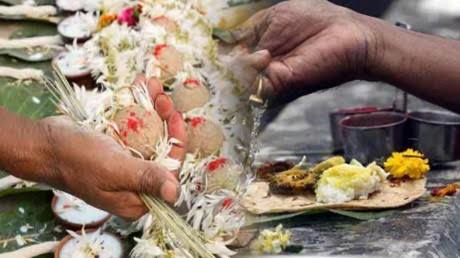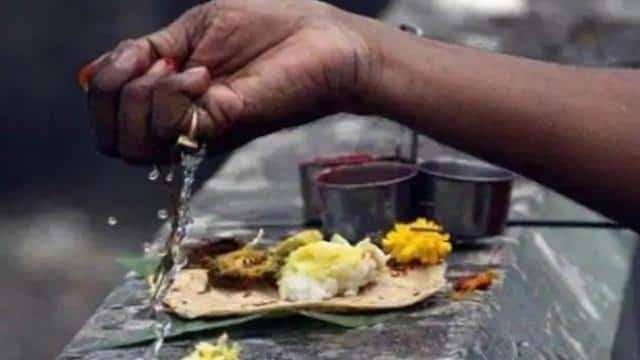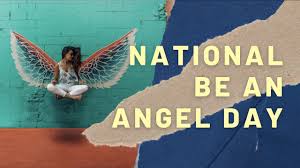Pitru Paksha – September 10, 2022, history, quotes, details, when is pitru paksha
Hindus are bound by their Dharma, or religion, to pray for the souls of their ancestors. It’s a debt they must pay to stay happy. During Pitru Paksha or Shraadh, a 16-lunar-day period in the Hindu calendar which starts this year on September 10, people offer prayers, food and water to their ancestors.

Hindus believe that the departed wander in a realm between heaven and earth (‘Pitru Lok’). Here, they are restless and still attached to worldliness (‘Maya’). The prayers and ritual offerings during Pitru Paksha free the souls and help them transition towards ‘Brahmaloka’ or heaven.
PITRU PAKSHA TIMELINE
3138 BCE
The story behind Pitru Paksha
When Karna ( a warrior during the times of the Mahabharata) dies, his soul is served foods made of gold and silver. His hungry soul learns that this is due to his karma. While Karna was alive, he donated gold and silver but no food. His soul prays and returns to earth to donate food for a better afterlife.
6000 – 1000 BCE
Earliest evidence of ancestor worship
Evidence of the earliest form of ancestor worship was found in China in the Yangshao society, which existed in the Shaanxi Province area.
AD 1624–74
Gai Jatra
Gai Jatra, the Nepalese festival that commemorates the death of the people during the year, was started by King Pratap Malla to show his grieving wife that she alone had not lost a son.
1877
Ancestor worship is signified by a scholar
Herbert Spencer, the English philosopher-scientist, wrote in ‘Principles of Sociology’ that ancestor worship was the root of every religion.
2008
UNESCO inscribes the Day of the Dead
Like Pitru Paksha, on the Day of the Dead, people pray for their ancestors. In 2008, this tradition was inscribed in the Representative List of the Intangible Cultural Heritage of Humanity by UNESCO.
HOW TO OBSERVE PITRU PAKSHA
Remember your ancestors with rituals
Consult a Hindu priest or a family elder to learn the special rituals. Foods offered consist of rice, black sesame seeds and barley flour balls (Pindaas) along with water.
Help those less fortunate
It’s believed that during Pitru Paksha, feeding and caring for anyone in need generates good karma that helps bring peace to the departed. What a great way to do your part!
Teach your children well
While you explain the significance of Pitru Paksha to your children, tell them that a good Hindu is respectful and loving to their parents, grandparents and elders. Remind your children that there are blessings in obedience.
5 WAYS TO GET A KARMIC BOOST LEARNING ABOUT PITRU PAKSHA
This is an inauspicious period
This 16-day period is considered an unfavorable time to start a new venture, get married, buy a house or a car.
Offer as a way to receive
Those who don’t offer food and water to their ancestors during Pitru Paksha will receive none in their afterlife.
It washes away sins
Pitru Paksha is also the time a Hindu can wash off the sins inherited from his ancestors by performing the rituals and making offerings.
Feeding crows — a good omen
A crow eating the offerings is considered a good sign because crows are believed to be representatives of the God of Death, Yama.
It was performed only by men
Traditionally, Pitru Paksha was performed only by men, particularly sons, but times have changed. In families where there are no sons, daughters can perform the rituals instead.
WHY PITRU PAKSHA IS IMPORTANT
Hindus believe it grants peace to their ancestors
According to the holy writings of the Gita and the Vedas, offerings made to the departed during Pitru Paksha bring peace to their souls and helps them reach their divine destination.
It reaffirms the Hindu faith in an afterlife
Death is not the end — it merely punctuates the cycle of birth and rebirths and Pitru Paksha marks the end of one’s physical body. For the soul, what follows is a journey determined by each person’s individual karma, which was earned during their lifetime.
It connects past and present generations
The Hindus believe that there are strong karmic ties between previous, current and future unborn generations. We are indebted to our ancestors. When we honor them by praying for their souls, we earn their blessings.
Sandeep Raiza — Content Writer, Website Designer, SEO Strategist, and WordPress Expert AI specialist delivering impactful digital solutions that drive business growth.Combining creative storytelling with technical expertise.




